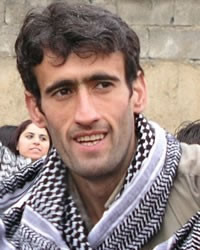Kurd, Kurmanji in Australia

Photo Source:
manothegreek
|
Send Joshua Project a map of this people group.
|
| People Name: | Kurd, Kurmanji |
| Country: | Australia |
| 10/40 Window: | No |
| Population: | 9,900 |
| World Population: | 16,544,400 |
| Primary Language: | Kurdish, Northern |
| Primary Religion: | Islam |
| Christian Adherents: | 1.00 % |
| Evangelicals: | 0.70 % |
| Scripture: | Complete Bible |
| Ministry Resources: | Yes |
| Jesus Film: | Yes |
| Audio Recordings: | Yes |
| People Cluster: | Kurd |
| Affinity Bloc: | Persian-Median |
| Progress Level: |
|
Introduction / History
Kurds are one of the largest people group clusters in the Middle East, yet they live in a land dominated by Arabs, Turks, or Iranians, depending on the exact location. In each of these countries, they are expected to conform to the dominant culture. Now some have migrated to other parts of the world like Australia where they must conform to an even greater cultural distance.
Since the late 1960s, Kurdish refugees began to move to Australia, where yet another layer of "identity crisis" has hit them. Different Kurdish refugees came to Australia speaking different languages, so it is not easy to have their kids go to a "Kurdish" language and culture class. Like many second-generation immigrants, Kurdish youths are caught between the old and the new cultures.
What Are Their Lives Like?
Some refugees, like the so-called Boat People of Southeast Asia, eventually managed to get re-established in their host countries. The Kurds in Australia are still having difficulties. Not only did many of them arrive with very little to get themselves started financially, but they lack business and language skills. They desperately need to learn English to find good jobs. As it is, many of them are in low-paying construction jobs.
What Are Their Beliefs?
Nearly all Kurds are Muslim, most being Shafiite Sunnis. They first embraced Islam after the Arab conquests of the seventh century. Today, they primarily look to Islam as a basis for social justice. However, despite being predominantly Muslim, religion has created deep rifts among the Kurds. Many of the dispossessed Kurd minorities have become associated with the secret and unorthodox sects of Islam.
What Are Their Needs?
Who am I? For Kurdish Muslims, this question is difficult. Their dignity and identity have been challenged for centuries. But they can find their identity and their dignity by clinging to the one who walked out of the grave!
Prayer Points
Pray for godly Christians to go to the Kurds in Australia to teach English and business skills.
Pray that Christian radio and TV broadcasts will fill the cultural gap by providing high quality materials in Kurmanji and other languages spoken by Kurds.
Pray that soon the Kurds in Australia will set their identity in the only savior.